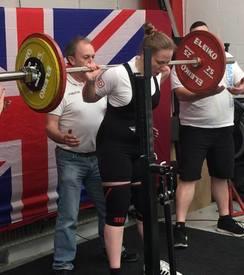Light weight/high rep V's high weight/low rep.

Meg_78
Posts: 998 Member
Can someone please explain the different effect that these two styles of lifting have on the body, what are the pros and cons of each, and is it ok If I want to mix it up and do a bit of both, or should I just stick to one type?
(Side note, I am not trying to lose weight, but improve my over all strength and increase muscle and maybe lower my BF%)
(Side note, I am not trying to lose weight, but improve my over all strength and increase muscle and maybe lower my BF%)
0
Replies
-
It is an often debated topic but...
Lifting heavier weights, and lower reps is typically used for strength. Lifting lower weights and higher reps helps build endurance.
Lifting higher reps and promoting endurance often leads to "larger" muscles as the cells adapt and store more glycogen and water.
In my opinion its important to change up your routine but I prefer a 12 rep split as I value endurance for sports etc. If you really care about how much you can lift do both. I like to aim for 3 sets of 12, and multiple exercises per group, if I hit it it means I need to up the weight. I always strive for 3 sets of 12 but should rarely hit it!0 -
My general understanding is this:
To improve strength you generally wan to do something like a 5x5 work out. (This is what I was doing at the beginning of this year while eating around maintenance).
To gain actual muscle size you want to do something that's "high volume", a "hypertrophy" program, so 2-3 lifts per muscle and 8-10 reps. (This is what I was doing over the winter when I was eating over maintenance)
To maintain muscle and strength a program like 3x5 or 3x8 with just compounds would be fine. (This is me now)
Higher reps, low weight, like 15-20 is basically cardio, or circuit training. It's good for muscle endurance, and I think it has some good hormonal benefits, etc. I used to do something like this last summer, went back to it once last week and now suck at it. Not sure if I care or not.
This is a really good article:
http://www.bodyrecomposition.com/training/weight-training-for-fat-loss-part-1.html0 -
Put simply:
<6 reps for strength/power. Example, powerlifters would use this range.
8-12 reps for hypertrophy (muscle building). Example, bodybuilders would likely use this range. Also I've seen a lot who combine this range, and the <6 reps range.
15+ for endurance. Would be useful if you have a job that requires endurance. Maybe manual work, carrying things around all day, also for strongman (along with the other rep ranges as well) it would be useful for when they have to do lifts as many times as they can, or carry things a distance.0 -
bump - want to read this later0
-
I'm an athlete, and I lift with lower reps, except for chin or pull ups which are to failiure and no more than 12-15 reps
Pretty much all athletes should be training in the 4-6 rep range except for endurance athletes.
The 4-6 rep range is best for explosiveness and still gets you strong and you will still gain muscle.
This can be a positive or a negative, but with lower reps you will be much stronger than you look.
My friend has about 15lbs of lean mass more than I do, yet I'm stronger.0 -
Popular topic today... I just posed this in another thread.
Heavy lifting is another reference to maximal strength or even absolute strength lifting. Lifting within this range on the force curve involves a weight that is between 80% and 100% of your 1-rep max (RM). This weight range typically includes a rep range of 1 to 5 reps, of course 100% of your 1RM should always equal 1-repetition. Moving into the 8 to 10 rep range is more of strength and hypertrophy (let's just call this moderate for ****s n giggles) mix but keep in mind that maximal strength training and moderate strength training do not lend the same results. Maximal strength training has a more profound effect on recruiting the body's nervous system and building neuro-muscular strength which other higher-rep range lifting can not do. Therefore it also has a more positive effect on enhancing an individual's athleticism.0 -
Bump ~Thanks for asking this question. Learned a great deal from what read already. :flowerforyou:0
-
depends on your goals, but from my experience lifting in the strength range also helps a bit with endurance.
this is completely anecdotal so i dont know (or even care to know :laugh: ) the biological reasons for this, but i do 5*5 routine 3 times a week. sometimes (like once every 4-6 weeks) i'll take a cardio kickboxing class and at the end we'll do some weight work. when i first started taking this class back in feb the endurance BW squats and zillion reps of arm stuff with 5 pound weights would kill me.
last time i took this class none of those things were an issue. i did all the reps and my heart rate dropped down to just a bit above resting. i never trained for endurance work but lifting heavy helped with that..
i also noticed the same thing happen with doing sprint sessions and that helping with my overall jogging endurance0 -
Thank you everyone for your well thought out advice!! (and for not taking the piss!)0
-
0
-
AWESOME LINK!
Thanks.0
This discussion has been closed.
Categories
- All Categories
- 1.4M Health, Wellness and Goals
- 398.5K Introduce Yourself
- 44.7K Getting Started
- 261K Health and Weight Loss
- 176.4K Food and Nutrition
- 47.7K Recipes
- 233K Fitness and Exercise
- 462 Sleep, Mindfulness and Overall Wellness
- 6.5K Goal: Maintaining Weight
- 8.7K Goal: Gaining Weight and Body Building
- 153.5K Motivation and Support
- 8.4K Challenges
- 1.4K Debate Club
- 96.5K Chit-Chat
- 2.6K Fun and Games
- 4.8K MyFitnessPal Information
- 18 News and Announcements
- 21 MyFitnessPal Academy
- 1.5K Feature Suggestions and Ideas
- 3.2K MyFitnessPal Tech Support Questions








 http://www.youtube.com/watch?v=WxDaaFVXFyU
http://www.youtube.com/watch?v=WxDaaFVXFyU